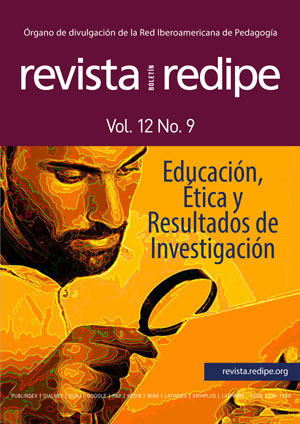Comportamiento no ético e incidencia en deserción y rendimiento académico de estudiantes regulares del subprograma medicina veterinaria, Unellez, 2023-I
##plugins.themes.bootstrap3.article.main##
Keywords
Comportamiento no ético, Deserción, Rendimiento académico
Resumen
El presente artículo es avance de investigación de Macro proyecto Interinstitucional, que persigue analizar el comportamiento no ético e incidencia en deserción y rendimiento académico en estudiantes regulares, del Subprograma Medicina Veterinaria, Sub proyecto Microbiología, de la Universidad Nacional Experimental de Los Llanos Occidentales “Ezequiel Zamora” período 2023-I. Esta investigación se justifica ante el comportamiento no ético en algunos docentes, que aprueban alumnos sin habilidades y destrezas, verificable por prueba diagnóstica empírica en la materia prelante, que predispone a deserción y ralentiza el progreso de la temática y por responsabilidad de autoridades al faltar supervisión y de estudiantes que callan ausencias del docente, en espera de ser aprobados solo por realizar un informe, que no defiende, ni dominan. En este sentido, el problema es: actitud e intencionalidad para desarrollar habilidades y destrezas en Microbiología, ante situaciones de comportamiento no ético dentro del aula de clase. En relación a la metodología, trata de investigación empírica, vinculada al área gestión educativa, sub-área desarrollo sostenible de la educación; enfoque cualitativo, nivel exploratorio, tipo hermenéutico; modalidad por diseño de campo; recolecta datos por observación directa y/o entrevista, construye instrumento propio y población-muestra tipo opinática. Conclusión: La investigación encontró el origen del problema en actos solapados con trasfondo para abordar al docente en referencia. La estrategia deja claro que tener principios y valores éticos garantiza el relevo generacional que está delante de los ojos y no, ¡en años por venir!
Referencias
Asamblea Nacional (1999). Constitución de la República Bolivariana de Venezuela. [En línea] https://www.oas.org
Cressey, Donald (1961). The prison: studies in institutional organization and change. [En línea] https://acfe-spain.com
Delgado, Pedro; García, Francisco y Lara, Luciana (2018), Rev Educación Mendive. Vól. 16 (1). [En línea] https:// scielo.sid.cu
Díaz; Elizabeth; Díaz, Carlos; Díaz, Karla y Zanatta, Mario (2015). Ética: ¿Cuál es la percepción de los jóvenes universitarios? Rev. De Estudios y Experiencias en Educación. Vól. 14 (27). Pp. 137-146. [En línea] https:// dialnet.unirioja.es
Hirsch; Ana (2011). Dilemas, tensiones y contradicciones en la conducta ética de os profesores.
Sinéctica. Núm. 37. Tlaquepaque. [En línea] https://scieo.org.mx
Hirsch, Ana (2012). Conductas no éticas en el ámbito universitario. Perfiles educativos. Vól. 34. Núm. especial. [En línea] https://scielo.org.mx
Ley Orgánica de Educación de la República Bolivariana de Venezuela (LOE, 2009) [En línea] https://tugacetaoficial.com
Mercado, Á; Amador, A; Cabana, J (2014). Políticas de acceso a la población vulnerable a la Educación superior. Rev. Clío América. Vol. 8 (5). Pp. 8-21. [En línea] https://doi. org/10.21676/23897848.826
Reglamento Unellez de los alumnos [En línea] https://unelez.edu.ve
Ríos, Gleidy (2018). Actitud del comportamiento ético en los estudiantes de la Facultad de Ciencias Económicas y Sociales de la Universidad de Los Andes-Venezuela. Rev. De Bioética Latinoamericana. Vól. 22 Pp. 84-100. [En línea] http://saber. ula.ve
Ugarte, Walter; Melgar, Teresa (2019). Los factores de riesgo de conducta antiética según el Modelo de Donald Cressey aplicado a la Universidad Nacional Mayor de San Marcos. Gestión en e tercer milenio. Vól. 22 (44). Pp. 5-15. [En línea] http://dx.doi.org/10.15381/ gtm.v22i44.17302



